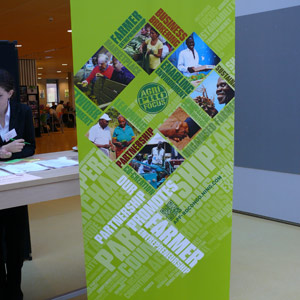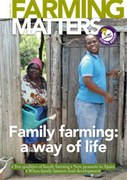Agricultural professionals are increasingly looking for new developments in training methods. We hear many theories about “what works”, but how do we translate these into an effective ways of developing knowledge? The expert meeting “Beyond Knowledge-Sharing” held in Den Bosch (the Netherlands), on October 22 aimed to facilitate this transition from knowledge to practice.

Different tools and concepts can help take learning to the next level. Some training experts shared their experience by (re)introducing methods such as using comic strips as a communication vehicle, making a message clear to a large range of audiences in a simple way. Or how about the use of simulations, or role-plays, to learn entrepreneurial skills? By acting out real-life situations and recording, reviewing and discussing them, people learn about verbal and non-verbal communication and commercial skills. For instance how would you, as the leader of a co-operative, respond to unreasonable requests and pressure from large companies? And how are such encounters experienced by the other party? In this way, students do not learn from the teacher, but the group learns from their own and others’ responses and experiences.
Another lesson explored was the importance of long-term support in developing knowledge. A long-term presence in the region has many advantages over a short “in-and-out” training. Some shared their experiences with translating a traditionally once-off publication into a coaching track. A publication does not have to be a final destination, but can be used to develop new research and projects. Also we must not forget to focus on people’s needs: clients should be co-producers of the services they receive. Their responses and needs should be part of service delivery, including knowledge building.
More than anything, the expert meeting embodied the drive towards innovation by bringing different actors together. Listening to others and taking a new perspective on learning lies at the heart of innovation. As one speaker at the meeting reminded us “real renewal comes from outsiders at the fringes of the existing system”.
Author
The expert meeting was organised by Agri-ProFocus, a Dutch network promoting farmer entrepreneurship in developing countries, in collaboration with some of its members: MDF Training & Consultancy, the International Centre for development oriented Research in Agriculture (ICRA) and HAS University of Applied Sciences in Den Bosch. Agri-ProFocus regularly organises gatherings for its members to share knowledge and make contact. For more information, contact info@agri-profocus.nl

